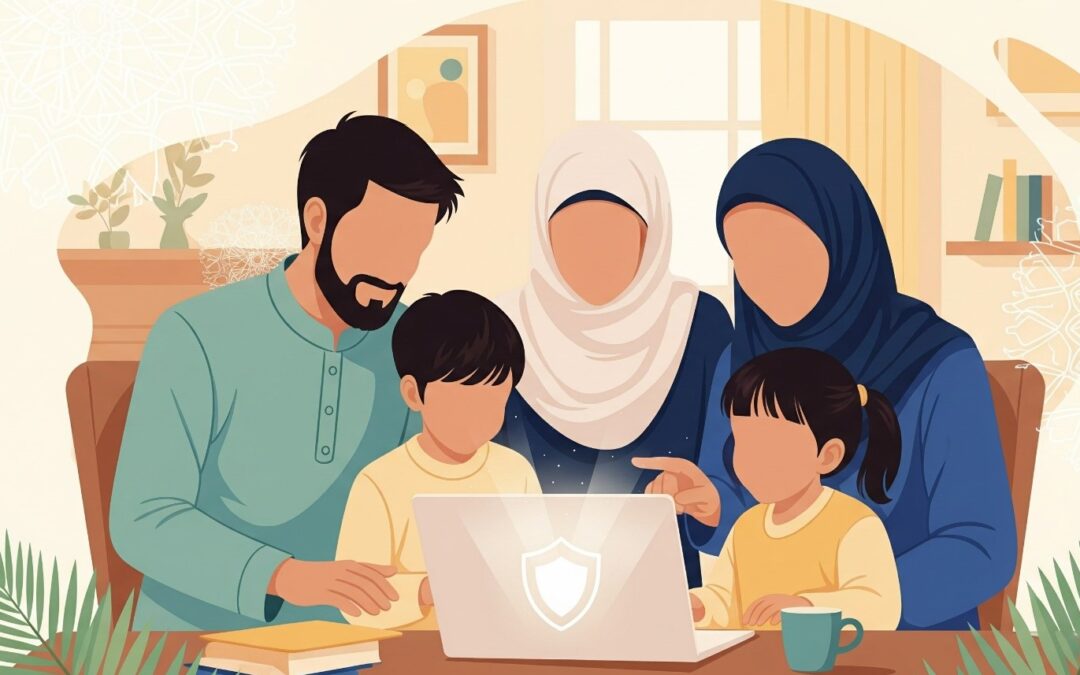Internet Safety for Muslim Families – Guiding Our Kids in Digital Age
Introduction
The internet is an amazing tool, offering endless opportunities for learning, connecting and fun. For our children, it’s a world they are growing up in! However, just like the real world, the online world has its challenges. As Muslim parents, it is our responsibility to guide our kids safely through this digital landscape, protecting them from harm while allowing them to benefit from its wonders. This blog will help you as a guide to understand important internet safety measures to ensure your family’s online well-being, rooted in our beautiful Islamic principles.
Why Internet Safety Is A Core Islamic Responsibility
In Islam, children are precious amanah (trust) from Allah (SWT). We are entrusted with thei physical, emotional and spiritual well being. This responsibilty extends to the digital realm. The internet can expose them to content and interactions that go against Islamic values or put them at risk.
The Quran Says :
“ O you who have believed, protect yourselves and your families from a Fire (Hell) whose fuel is people and stones.“ (Quran 66:6).
This verse emphasizes our duty to safeguard our families and children from all forms of harm, including that which lurks online.
The Holy Prophet (P.B.U.H) also taught us :
“ Each of you is a shephard and each of you is responsible for his flock (Families).“ (Sahih Bukhari).
This Hadith highlights the leadership role of parents in guiding and protecting their children in every aspect of life.
Important Internet Safety Measures for Your Family and Children – Practical Steps
Taking simple, consistent steps can make a big difference in creating a safer online environment for your children
1. Open Communication Is Key
- Talk to your children regularly about what they do online. Ask them about their favorite websites, games and apps.
- Encourage them to tell you if they see anything that makes them uncomfortable or if someone tries to talk to them in a strange way.
- Keep lines of communication open, without judgement. They should feel safe coming to you with any concern.
The Hadith states :
“ The leader of a people is their servant“, reinforcing the importance of guiding our children.
2. Set Clear Rules & Boundaries
- Work with your children to create family rules for internet use. This includes screen time limits, appropriate content and acceptable websites/apps.
- Decide when devices can be used (e.g in common family areas and not bedrooms).
- Explain why these rules are in place, relating them to Islamic values of modesty, respect and seeking beneficial knowledge.
The Hadith that states :
“ Your body has right over you “ emphasizes life balance, which can easily apply to screen time.
3. Use Parental Controls & Privacy Settings
- Familiarize yourself with and activate parental control features on devices, apps and browsers.
- Teach your children about privacy settings on social media and apps. Show them how to keep their personal information private.
- Regularly check privacy settings, as they can sometimes change with updates.
In Surah Al-Baqarah (2:282), Allah Advises us to be mindful of our words and actions :
“ And do not conceal testimony, for whoever conceals it – his heart is indeed sinful“. Teaching children to manage their online presence aligns with these values.
4. Encourage Critical Thinking
- Encourage your children to question online content. Not everything they see is accurate and critical thinking skills help them differentiate between trustworthy and misleading information.
The Quran places value on truth-seeking. Surah Al-Hujurat (49:12) warns against suspicions, stating :
“ O you who have believed, avoid much (nagative) assumption“. Equipping children with analytical skills will enable them to nevigate the web wisely.
5. Encourage Respectful Online Interactions
- Teach your children the significance of kindness and respect in their online interactions.
- The internet can empower negative behaviors, establishing empathy and respect is crucial.
- Discourage exposure to inappropriate or harmful content that goes against Islamic teachings of modesty, respect and truthfulness.
The Holy Prophet (P.B.U.H) Said :
“ The best of people are those who are most beneficial to others.“ Encouraging a positive online presence can enhance digital communication.
6. Monitor Digital Footprints & Lead By Example
- Discuss digital footprints with your children. Remind them that posts can have long-lasting effects.
In Surah Al-Isra (17:36), Allah Says :
“ And donot follow that of which you have no knowledge.“ Teaching children about their online traces will help them be concious of their actions.
- Your own digital habits matter. Be mindful of your screen time, what you share and how you interact online. Children learn best by observing.
Practical Tools For Internet Safety
1. Parental Control Software :
Consider using parental control software that can help monitor online activities, set time limits and filter inappropriate content. Popular options like Net Naany or Norton Family allow parents to see how and when children use the internet, This insight can encourage informed discussions about their online habits.
2. Educational Resources :
Utilize books and websites designed to teach children about internet safety. Groups like Common Sense Media provide valuable information, focusing on healthy digital habits.
3. Family Tech Agreements :
Establishing a family tech agreement to clarify expectations regarding internet use. Involving children in its creation can encourage accountability and ensure they grasp the guidelines.
Conclusion
Navigating the internet safely is a shared effort between parents and children. The digital world is here to stay and our children will interact with it throughout their lives. By implementing these safety measures and tools, and grounding our guidance in Islamic guidance, we can empower our children to navigate the internet wisely and responsibly.
Our goal is to ensure they can benefit from its vast resources, including quality Online Quran Classes and Islamic Studies Online, while remaining protected and true to their faith.
Let us raise a generation that uses technology for good, seeking beneficial knowledge and spreading peace, inshaAllah.


